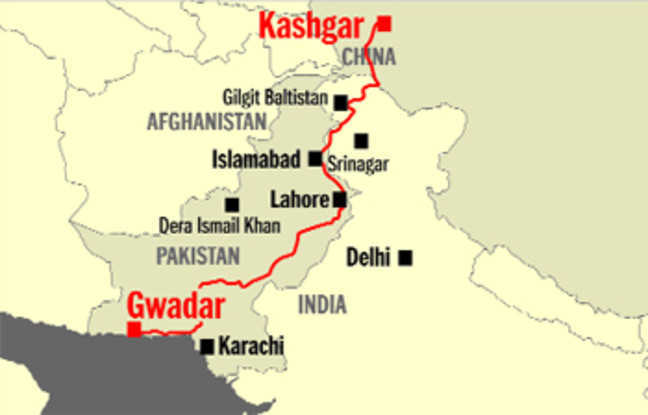CPEC to remain vulnerable to attacks

Two attacks on China-funded projects and its nationals within a week have underlined the fact that the China-Pakistan Economic Corridor (CPEC) remains under threat and will continue to do so in the future as well. The major reason for the CPEC to remain vulnerable is the anger among locals. They claim the CPEC that was forcefully implemented has affected their livelihood, rights and cultural identity.
Five Chinese nationals were killed in a suicide bombing in Pakistan’s Khyber Pakhtunkhwa province as they were heading to the Dasu Dam, the biggest hydropower project funded by China.[1] This attack came less than a week after a similar attack in Balochistan where separatists opened fire on a convoy carrying Chinese citizens working on another China-sponsored Gwadar port project.[2]
The Gwadar Port is the most crucial element of the CPEC as it allows China to establish closer and faster connectivity with the Middle East. China wants the CPEC to succeed at any cost thanks to the geostrategic and economic interests it aims to serve. However, the rising attacks on the CPEC projects, especially, in the vital location of Gwadar have made things difficult.
Many areas in Pakistan, especially, Balochistan, have witnessed agitation over the concerns arising out of CPEC development. People have been protesting against the exploitation of local resources, economic exclusion, and state-sponsored brutality. “Locals remain unhappy over lack of access to clean drinking water, loss of livelihood due to Chinese deep-water fishing, and limited access to jobs in key projects being undertaken in and around Gwadar,” said Uzair Younus, director of the Pakistan Initiative at the Atlantic Council.[3]
Citing the injustice meted out to the people of Balochistan, a recent editorial by Pakistan’s reputed newspaper Dawn sought an “examination of socio-political and economic aspects” to find a solution to the rising attacks on Chinese projects. “Foreign investment is direly required but the fruits of these projects — whether CPEC-related, mining schemes, or others — must reach the people of Balochistan,” reads its editorial.[4]
A few years ago, both China and Pakistan claimed that the attacks on the CPEC would not hurt its development.[5] However, now they realise the attacks do pose a threat to the progress of the mega project and even bilateral relations.[6][7] Experts said the attacks showed the world that CPEC or Gwadar is not safe. Security analyst Fakhar Kakakhel said CPEC cannot be completed until local issues are heard and resolved.[8] However, the Islamabad government is instead escalating tension and suppressing the protesters’ voices through violent means, he added.
The Chinese activities have made people in Balochistan sceptical about losing their identity. They are scared that they will be outnumbered and thus become a minority in their own province.[9][10] Gwadar resident Dr Abdul Aziz said locals were forced to migrate to remote areas after construction of the Gwadar Port began and outsiders bought lands. “Our resources are being plundered, and we are being deprived of our livelihood. We should be the masters of our resources, but we are being treated like slaves. This will have catastrophic consequences,” he continued.[11]
As the Islamabad government fails to resolve issues that locals face, attacks on the Chinese projects are likely to occur in future too. “The attacks have been rising for quite some time, a reflection of increasingly emboldened separatist militants angry about Chinese investments,” said Michael Kugelman, a South Asia expert at the Washington-based Woodrow Wilson International Centre for Scholars.[12]
Experts said the unrest and attacks on the CPEC project will not stop as Islamabad resorts to retaliation and the use of force. “Instead of using force, the government has to listen to people’s basic needs. There is no other way out of this,” said Canada-based development specialist Mariyam Suleman. [13] However, both Pakistan and China preferred taking revenge rather than opening a dialogue with the protesting people.[14][15]
Kugelman said China is uneasy over the occurrence of deadly attacks despite promises of deploying more security from Pakistan. “It’s an indication of the limits of Pakistan’s capacity to keep Chinese nationals safe, and this is certainly unsettling for Beijing,” he said.[16] Now, locals have reiterated their vows to fight the “increased brutalities and human rights violations” under the CPEC. “Baloch resistance groups have issued warnings to China urging them to siege activities in Balochistan and abandon the projects in the region, failure to do so, they warn, will result in further attacks,” said Khurshid Ahmed, the Information Secretary of the Baloch Human Rights Council.
END.
[1] https://www.nbcnews.com/news/world/5-chinese-nationals-are-killed-pakistan-suicide-attack-rcna145226
[2] https://www.aljazeera.com/news/2024/3/20/pakistans-gwadar-port-attacked-eight-armed-fighters-killed
[3] https://www.atlanticcouncil.org/blogs/southasiasource/with-pakistans-economy-in-freefall-chinese-economic-and-military-influence-is-likely-to-grow-in-the-country/
[4] https://www.dawn.com/news/1822893/gwadar-attack
[5] https://www.dw.com/en/china-consulate-attack-why-pakistans-baloch-separatists-are-against-beijing/a-46424112
[6] https://www.mfa.gov.cn/eng/xwfw_665399/s2510_665401/202403/t20240327_11271358.html
[7] https://abcnews.go.com/International/wireStory/pakistan-perform-dna-testing-remains-suicide-bomber-killed-108536949
[8] https://asia.nikkei.com/Politics/International-relations/Attack-in-Pakistan-s-Gwadar-strikes-near-heart-of-China-s-interests
[9] https://www.dawn.com/news/1809418
[10] https://thediplomat.com/2018/11/why-balochs-are-targeting-china/
[11] https://www.dw.com/en/china-consulate-attack-why-pakistans-baloch-separatists-are-against-beijing/a-46424112
[12] https://www.dw.com/en/pakistan-are-attacks-on-chinese-workers-jeopardizing-beijings-cpec-projects/a-61618631
[13] https://asia.nikkei.com/Spotlight/Belt-and-Road/Pakistan-s-Belt-and-Road-hub-Gwadar-hit-by-protest-clampdown#selection-3277.0-3277.15
[14] https://www.globaltimes.cn/page/202204/1260412.shtml
[15] https://www.mfa.gov.cn/eng/xwfw_665399/s2510_665401/202403/t20240327_11271358.html
[16] https://www.dw.com/en/pakistan-are-attacks-on-chinese-workers-jeopardizing-beijings-cpec-projects/a-61618631






